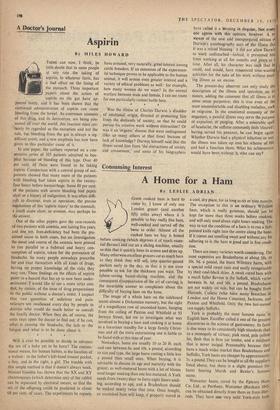A Doctor's Journal .
Aspirin
By MILES. HOWARD THERE can now, I think, be little doubt that in some people at any rate the taking of aspirin, in whatever form, has a bad effect on the lining of the stomach. Three important papers about the action of aspirin on the gut have ap- peared-lately, and it has been shown that the continued. administration of aspirin can cause bleeding from the bowel. As enormous amounts of this, drug, and its 'derivatives, are being con- sumed 'all over the world, this reaction must-cer- tainly be regarded as the exception and not the rule, bin bleeding from the gut- is -always a sig- nificant event, and a new emphasis has now been given to this particular cause of it.
In ofie" paper, -the authors reported on a con- secutive .series of 103 patients admitted to hos- pital because of bleeding of this type. Over 40 per cent. of them were found to be 'taking aspirin. Comparison with a control group of out- patients showed that many more of the patients with bleeding had taken aspirin in the twenty- four hours before hemorrhage. Some 80 per cent. of the patients with severe bleeding had peptic ulcer or a history of indigestion. It was often diffi- cult to discover, even at operation, the precise mechanism of this 'aspirin injury' to the stomach; a small- acute ulcer, or erosion, may -perhaps- be the answer.
One of the other papers gave the case-records of two Patients with ancemia, one lasting five years and one ten. Iron-deficiency had been the pre- sumed cause in both cases, but on investigation the onset -and course of the antemia were proved to run parallel to a habitual and heavy con- sumption of aspirin, -taken for the prevention of headache. So many people nowadays prescribe . for and treat themselves with all kinds of drugs, having no proper knowledge of the risks they may run. These findings on the effects of aspirin point to a- hazard that has up to now been under- estimated. I would like to see a more strict con- trol, by statute, of the issue of drug preparations to the public without a doctor's order. I suspect that vast quantities of sedatives and pain- relievers are swallowed every day by people in distress who would do much better to consult the family' doctor. When they do, of course, the onus rests upon the doctor to find out, if he can, what is causing the headache, the itch or the fatigue and what is to be done about it.
Will it ever be possible to decide in advance the sex of a baby yet to be born? The conven- tional means, for human babies, is the location of a walnut : in the father's left-hand trouser pocket, a boy, and in the right, a girl. The trouble with ,this simple method is that it doesn't always work. Manuel 'Gordon has shown that the XX and XY chromosomes (which determine sex) of the rabbit can be separated by electrical means, so that the sex of the offspring could be predicted in about 68 per cent. of cases. The experiments he reports • have aroused, very naturally, great interest among cattle breeders. If an extension of the experimen- tal technique proves to be applicable to the human animal, it will arouse even greater interest and a variety of ethical problems as well : for example, how many women do we want? In the eternal warfare between male and female;! can see room for one particularly violent battle here.
Was the illness of Charles Darwin h disorder emOtional origin, directed at protecting him from the demands of society, so that he could pursue his creative work without distraction? Or was it an 'organic' disease that went undiagnosed (like so many others at that time) because of lack of knowledge? Darwin himself said that the illness saved him from `the distractions of society and amusement,' and some of his biographers have called it a blessing iti disguise, Not every- one agrees with this opinion, however. A re- viewer of the new and unexpurgated edition of Darwin's autobiography says of the illness that it was a mixed blessing : it did not allow Darwin to work undisturbed—indeed, it prevented hilt: from working at all for months and years at 5 time. After all, his character ,vas such that he could, and would, have renounced time-wasting activities for the sake of his work without need, ing illness as an excuse.
The present-day observer can only studs description of the illness and speculate ol nature, adding the comment that all illness some sense purposive; this is true even of most uncomfortable and disabling maladies, as migraine. In the emotional economy of organism, a paidul illness may serve the pur of expiation, or purging. After a miserable of headache, the sufferer commonly feels 'clea having served his penance, he can begin al Whether Darwin had a physical infection or the illness was taken up into his scheme of and had a function there. What his achieve' would have been without 'it, who can say? the its is in ' the such the pose spell red.; gain. not, life
lient

























 Previous page
Previous page